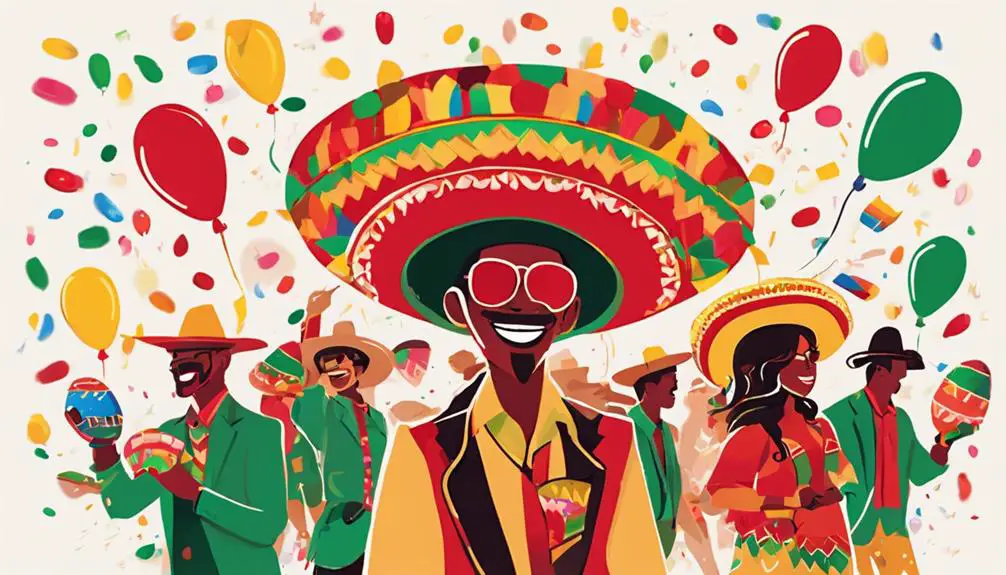When you say or hear '¡Enhorabuena!', you're not just congratulating someone – you're delving into a rich cultural heritage that spans centuries and continents. This phrase, rooted in Latin and born in Spanish-speaking cultures, is more than just a celebratory phrase. It's an integral part of milestone events, conveying community, pride, and joy. You'll find it's used in both formal and informal settings, adapting its tone to fit the occasion. Want to master the art of congratulations like a native? Discover the ins and outs of '¡Enhorabuena!' and reveal the secrets to heartfelt celebrations.
Origins of the Phrase

You stumble upon the phrase 'Enhorabuena' in various Spanish-speaking cultures, but have you ever wondered where this congratulatory phrase originated from? The answer lies in its Latin roots. The phrase 'Enhorabuena' is derived from the Latin words 'in' (meaning 'in' or 'on'), 'hora' (meaning 'hour' or 'time'), and 'buena' (meaning 'good'). When combined, 'Enhorabuena' literally translates to 'in good time' or 'at a good hour.'
Historical evolution played a significant role in shaping the phrase's meaning. In the Middle Ages, 'Enhorabuena' was used to express congratulations on a timely or fortunate event, such as a wedding or a birth. Over time, the phrase evolved to encompass a broader range of celebratory occasions, including graduations, promotions, and achievements.
Today, 'Enhorabuena' is a ubiquitous phrase in Spanish-speaking cultures, used to express joy and congratulations on any remarkable accomplishment.
Correct Pronunciation Guide
When pronouncing 'Enhorabuena' correctly, one must pay attention to the syllable stress and intonation, as mispronunciation can alter the phrase's meaning and undermine its celebratory tone. You'll want to emphasize the 'e' in 'en' and the 'bu' in 'buen', with a slight rise in pitch at the end. Accent marks are vital in Spanish, and in this case, the accent on the 'e' in 'Enhorabuena' indicates that the stress falls on that syllable.
To master the correct pronunciation, consider using pronunciation practice apps like Forvo or Speechling. These tools allow you to listen to native speakers and practice speaking yourself, receiving feedback on your pronunciation. You can also record yourself and compare your pronunciation to that of native speakers.
Formal and Informal Uses

In both formal and informal settings, Enhorabuena is used to express congratulations, but the tone and context greatly influence the phrase's connotation and suitability.
You'll find that in formal situations, such as a job promotion or academic achievement, Enhorabuena is used with a formal tone to convey respect and professionalism. For instance, you might say 'Enhorabuena, ¡felicidades por tu nuevo trabajo!' (Congratulations, congratulations on your new job!) to a colleague or acquaintance.
On the other hand, in casual gatherings or with close friends, Enhorabuena takes on a more relaxed, casual vibe. You might say '¡Enhorabuena, hermano! ¡Felicidades por tu nuevo bebé!' (Congratulations, bro! Congratulations on your new baby!) to a friend.
In both cases, the phrase is used to express joy and celebration, but the tone and language used adapt to the specific context. As you navigate different social situations, being mindful of the tone and language you use will help you convey your congratulations with confidence and cultural sensitivity.
Cultural Significance Explained
Beyond its everyday usage, Enhorabuena holds significant cultural weight in Spanish-speaking countries, where it's deeply rooted in tradition and celebration. You'll often hear it shouted at weddings, graduations, and other milestone events, where it's an integral part of the fiesta atmosphere.
In Latinx culture, Enhorabuena is more than just a phrase – it's a declaration of joy, pride, and community. When you say Enhorabuena, you're not just congratulating someone; you're acknowledging their achievement and welcoming them into a shared experience. It's a phrase that transcends language barriers, speaking directly to the heart of Latinx identity.
In a culture that values family, community, and celebration, Enhorabuena is the glue that holds it all together. As you explore the cultural significance of Enhorabuena, you'll discover a rich tapestry of traditions, rituals, and customs. From the vibrant colors of a Mexican fiesta to the warm hospitality of a Spanish gathering, Enhorabuena is the thread that weaves it all together.
Common Misconceptions Cleared

Despite its widespread use, many people mistakenly believe Enhorabuena is only used for grand, life-changing occasions, but that's far from the truth. You might think it's reserved for monumental events like weddings or graduations, but in reality, Enhorabuena is used in a variety of situations.
In Spanish-speaking cultures, Enhorabuena is a versatile expression that can be used in both formal and informal settings. You'll often hear it at social gatherings, celebrations, and even in casual conversations. It's essential to understand that language nuances play a significant role in shaping cultural differences. For instance, in some Latin American countries, Enhorabuena is used more frequently than in Spain.
One common misconception is that Enhorabuena is only used for achievements, but it can also be used to express good wishes or congratulations for a new job, a new home, or even a birthday.
Using Enhorabuena in Context
You'll find Enhorabuena woven into everyday conversations, from congratulating a friend on a new business venture to celebrating a colleague's work anniversary. As you navigate social scenarios, you'll notice how naturally Enhorabuena flows into conversations.
When a friend shares exciting news, a heartfelt 'Enhorabuena' can convey your genuine enthusiasm and support. This phrase has a way of acknowledging someone's achievement while also expressing your emotional resonance with their joy.
In casual gatherings or professional settings, Enhorabuena helps create a sense of community and shared celebration. For instance, at a friend's graduation party, a warm 'Enhorabuena' can accompany a congratulatory hug or a toast. Similarly, in a meeting room, it can be used to praise a team member's innovative project or milestone.
Mastering the Art of Congratulations

As you master the art of congratulations, your ability to express genuine praise and appreciation will greatly enhance your relationships and social interactions. In Spanish-speaking cultures, congratulations are an essential part of social etiquette, and understanding the nuances of congratulatory phrases can help you build stronger connections with native speakers.
| Cultural Norms | Gift Etiquette | Congratulations Phrases |
|---|---|---|
| Respect for elders | Gift wrapping is important | ¡Enhorabuena! (Congratulations!) |
| Family-oriented | Gifts are often exchanged | ¡Felicidades! (Congratulations!) |
| Emphasis on hospitality | Gifts are often opened publicly | ¡¡Qué alegría! (What joy!) |
| Value on education | Educational achievements are celebrated | ¡Lo has logrado! (You did it!) |
Frequently Asked Questions
Can I Use "Enhorabuena" in Written Congratulations?
When writing congratulations, you can use 'enhorabuena' in a formal tone, especially in professional or formal settings.
However, in casual settings, you might want to opt for more casual alternatives like 'felicidades' or '¡bravo!' to convey a more relaxed tone.
Is "Enhorabuena" Used in All Spanish-Speaking Countries?
Imagine you're traveling across Latin America, hearing different accents and phrases.
You wonder, is 'enhorabuena' universally accepted? Not quite. Regional dialects and cultural nuances vary greatly across Spanish-speaking countries.
While 'enhorabuena' is widely understood, some countries have their own expressions. For instance, in Argentina, you'd say 'felicidades,' whereas in Mexico, '¡éxito!' is common.
Be mindful of these differences to show respect for local customs.
Can I Respond to "Enhorabuena" With "Gracias"?
You're wondering if you can respond to 'enhorabuena' with 'gracias'.
In many cultures, it's common to express gratitude when receiving congratulations.
In this case, responding with 'gracias' is perfectly fine.
Pay attention to cultural norms and verbal cues, though.
If the person congratulating you is from a more formal or traditional background, they might expect a more elaborate response.
But in general, a simple 'gracias' will suffice.
Is "Enhorabuena" Only Used for Big Accomplishments?
Imagine you're standing on the summit, basking in the glory of a hard-won achievement. Now, you're wondering, is 'enhorabuena' reserved only for monumental accomplishments?
Not necessarily. While it's often used for significant milestones, you can use it for everyday achievements too. It's not just for Olympic medals or PhDs; 'enhorabuena' can be applied to casual celebrations, like acing a project or landing a new job.
Can I Use "Enhorabuena" to Congratulate Someone on a Birthday?
When wishing someone a happy birthday, you might wonder if 'enhorabuena' is the right phrase. In general, you don't use 'enhorabuena' for birthday wishes. It's typically reserved for big accomplishments, like graduations or weddings.
For birthdays, stick to 'feliz cumpleaños' or 'happy birthday' in Spanish. This follows cultural norms, ensuring your well-wishes are received with appreciation.
Conclusion
You've mastered the art of congratulations, and it's about time! As you ride off into the sunset, remember that '¡enhorabuena!' is more than just a phrase – it's a cultural key that opens a world of connection and celebration.
So, the next time you're tempted to simply say 'congrats,' take a cue from the Spaniards and give a hearty '¡enhorabuena!' – your relationships (and your sense of style) will thank you.







